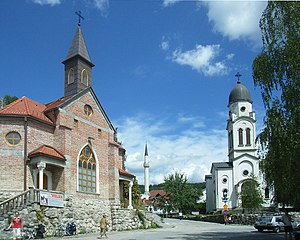
Back الدين في البوسنة والهرسك Arabic Religija u Bosni i Hercegovini BS Religión en Bosnia y Herzegovina Spanish Uskonto Bosnia ja Hertsegovinassa Finnish Religion en Bosnie-Herzégovine French Religija u Bosni i Hercegovini Croatian Կրոնը Բոսնիա և Հերցեգովինայում Armenian Agama di Bosnia dan Herzegovina ID Religioni in Bosnia ed Erzegovina Italian Религија во Босна и Херцеговина Macedonian
Religion in Bosnia and Herzegovina (2013 census)[1]

The most widely professed religion in Bosnia and Herzegovina is Islam and the second biggest religion is Christianity. Nearly all the Muslims of Bosnia are followers of the Sunni denomination of Islam; the majority of Sunnis follow the Hanafi legal school of thought (fiqh) and Maturidi theological school of thought (kalām).[2] Bosniaks are generally associated with Islam, Croats of Bosnia and Herzegovina with the Roman Catholic Church, and Bosnian Serbs with the Serbian Orthodox Church. The State Constitution of Bosnia and Herzegovina (BiH) and the entity Constitutions of the Federation of Bosnia and Herzegovina and the Republika Srpska provide for freedom of religion, and the Government generally respects this right in ethnically integrated areas or in areas where government officials are of the majority religion; the state-level Law on Religious Freedom also provides comprehensive rights to religious communities. However, local authorities sometimes restricted the right to worship of adherents of religious groups in areas where such persons are in the minority.
Government protection of religious freedom declined, especially during the campaign period prior to the October 2006 national elections, due to selective legal enforcement and the indifference of some government officials. At the end of the period covered by this report, the Government was implementing the State Law on Religious Freedom to protect the rights of religious communities and create a government registry allowing them to establish legal status.
Societal abuses and discrimination based on religious belief and practice persisted. Religious intolerance directly reflected ethnic intolerance because of the virtually indistinguishable identification of ethnicity with religious background. Discrimination against religious minorities occurred in nearly all parts of the country. In some communities, local religious leaders and politicians contributed to intolerance and an increase in nationalism through public statements and sermons. A number of illegally constructed religious objects continued to cause ethnic/religious tension and conflict in various communities. Religious symbols were often misused for political purposes.
In a 2009 Gallup poll, 77% of respondents in Bosnia and Herzegovina answered 'yes' to the question "Is religion an important part of your daily life?", while 21% responded negatively.[3] According to a 2017 Pew Research poll, 26% of Bosnian Muslims, 85% of Orthodox Christians and 43% of Catholic Christians reported attending religious services once a week or more than once a week.[4]
- ^ "Bosnia and Herzegovina". United States Department of State. Retrieved 2022-10-23.
- ^ Oliver Scharbrodt; Samim Akgönül; Ahmet Alibašić; Jørgen S. Nielsen; Egdunas Racius, eds. (2016). Yearbook of Muslims in Europe. Vol. 7. Brill. p. 117. ISBN 9789004308909.
Bosnian Muslims are overwhelmingly Sunnis who follow the Hanafi School of Islamic law and Maturidi School of Islamic doctrine.
- ^ "World - Gallup Topic". Gallup.com. Retrieved 4 January 2018.
- ^ "Final Topline Religious Belief and National Belonging in Central and Eastern Europe" (PDF). Assets.pewresearch.org. p. 118. Retrieved 4 January 2018.
© MMXXIII Rich X Search. We shall prevail. All rights reserved. Rich X Search